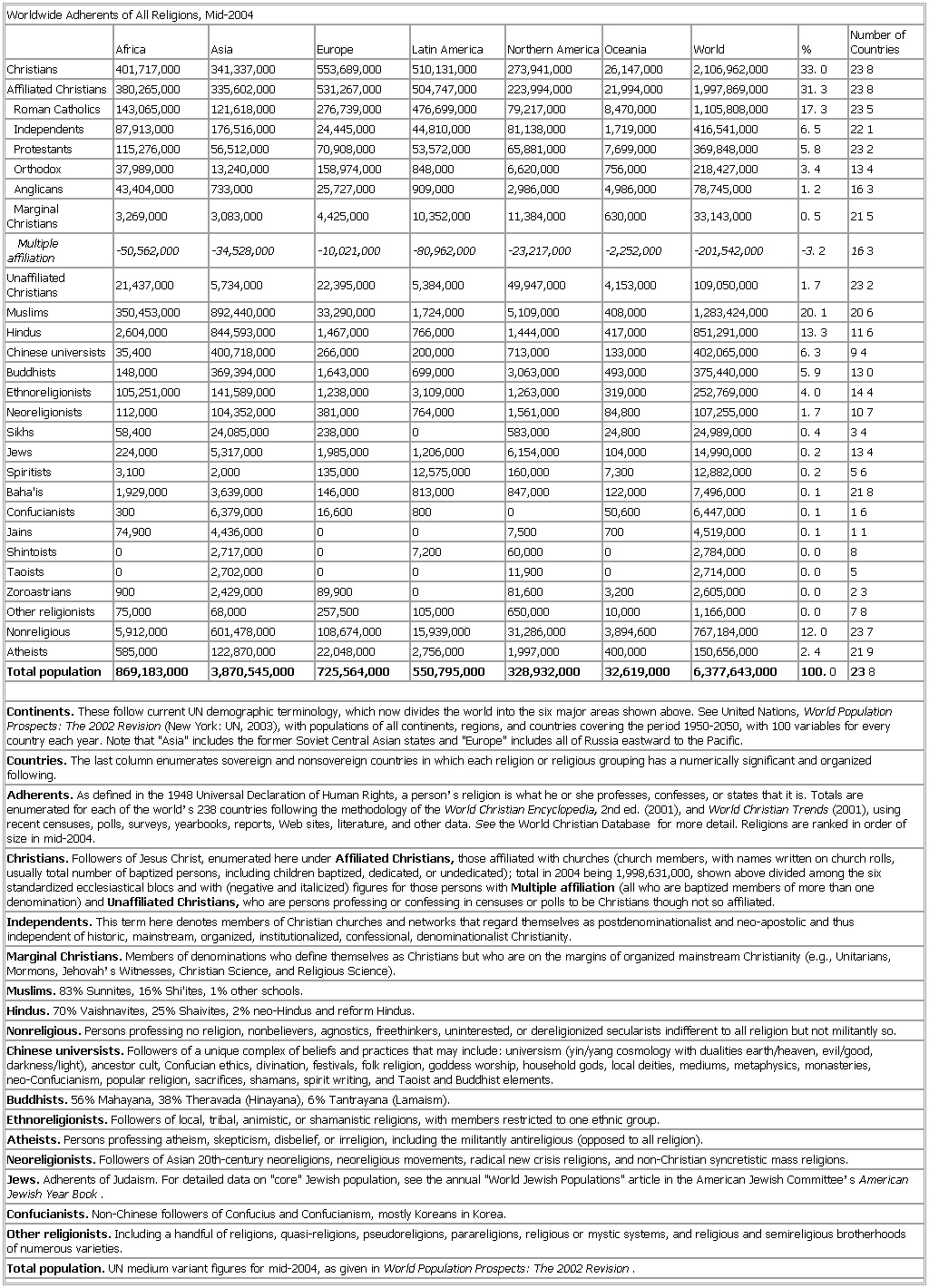- Worldwide Adherents of All Religions, Mid-2004
-
▪ TableWorldwide Adherents of All Religions, Mid-2004Africa Asia Europe Latin America Northern America Oceania World % Number of CountriesChristians 401,717,000 341,337,000 553,689,000 510,131,000 273,941,000 26,147,000 2,106,962,000 33.0 238Affiliated Christians 380,265,000 335,602,000 531,267,000 504,747,000 223,994,000 21,994,000 1,997,869,000 31.3 238Roman Catholics 143,065,000 121,618,000 276,739,000 476,699,000 79,217,000 8,470,000 1,105,808,000 17.3 235Independents 87,913,000 176,516,000 24,445,000 44,810,000 81,138,000 1,719,000 416,541,000 6.5 221Protestants 115,276,000 56,512,000 70,908,000 53,572,000 65,881,000 7,699,000 369,848,000 5.8 232Orthodox 37,989,000 13,240,000 158,974,000 848,000 6,620,000 756,000 218,427,000 3.4 134Anglicans 43,404,000 733,000 25,727,000 909,000 2,986,000 4,986,000 78,745,000 1.2 163Marginal Christians 3,269,000 3,083,000 4,425,000 10,352,000 11,384,000 630,000 33,143,000 0.5 215Multiple affiliation -50,562,000 -34,528,000 -10,021,000 -80,962,000 -23,217,000 -2,252,000 -201,542,000 -3.2 163Unaffiliated Christians 21,437,000 5,734,000 22,395,000 5,384,000 49,947,000 4,153,000 109,050,000 1.7 232Muslims 350,453,000 892,440,000 33,290,000 1,724,000 5,109,000 408,000 1,283,424,000 20.1 206Hindus 2,604,000 844,593,000 1,467,000 766,000 1,444,000 417,000 851,291,000 13.3 116Chinese universists 35,400 400,718,000 266,000 200,000 713,000 133,000 402,065,000 6.3 94Buddhists 148,000 369,394,000 1,643,000 699,000 3,063,000 493,000 375,440,000 5.9 130Ethnoreligionists 105,251,000 141,589,000 1,238,000 3,109,000 1,263,000 319,000 252,769,000 4.0 144Neoreligionists 112,000 104,352,000 381,000 764,000 1,561,000 84,800 107,255,000 1.7 107Sikhs 58,400 24,085,000 238,000 0 583,000 24,800 24,989,000 0.4 34Jews 224,000 5,317,000 1,985,000 1,206,000 6,154,000 104,000 14,990,000 0.2 134Spiritists 3,100 2,000 135,000 12,575,000 160,000 7,300 12,882,000 0.2 56Baha'is 1,929,000 3,639,000 146,000 813,000 847,000 122,000 7,496,000 0.1 218Confucianists 300 6,379,000 16,600 800 0 50,600 6,447,000 0.1 16Jains 74,900 4,436,000 0 0 7,500 700 4,519,000 0.1 11Shintoists 0 2,717,000 0 7,200 60,000 0 2,784,000 0.0 8Taoists 0 2,702,000 0 0 11,900 0 2,714,000 0.0 5Zoroastrians 900 2,429,000 89,900 0 81,600 3,200 2,605,000 0.0 23Other religionists 75,000 68,000 257,500 105,000 650,000 10,000 1,166,000 0.0 78Nonreligious 5,912,000 601,478,000 108,674,000 15,939,000 31,286,000 3,894,600 767,184,000 12.0 237Atheists 585,000 122,870,000 22,048,000 2,756,000 1,997,000 400,000 150,656,000 2.4 219Total population 869,183,000 3,870,545,000 725,564,000 550,795,000 328,932,000 32,619,000 6,377,643,000 100.0 238Continents. These follow current UN demographic terminology, which now divides the world into the six major areas shown above. See United Nations, World Population Prospects: The 2002 Revision (New York: UN, 2003), with populations of all continents, regions, and countries covering the period 1950-2050, with 100 variables for every country each year. Note that "Asia" includes the former Soviet Central Asian states and "Europe" includes all of Russia eastward to the Pacific.Countries. The last column enumerates sovereign and nonsovereign countries in which each religion or religious grouping has a numerically significant and organized following.Adherents. As defined in the 1948 Universal Declaration of Human Rights, a person s religion is what he or she professes, confesses, or states that it is. Totals are enumerated for each of the world s 238 countries following the methodology of the World Christian Encyclopedia, 2nd ed. (2001), and World Christian Trends (2001), using recent censuses, polls, surveys, yearbooks, reports, Web sites, literature, and other data. See the World Christian Database
for more detail. Religions are ranked in order of size in mid-2004. Christians. Followers of Jesus Christ, enumerated here under Affiliated Christians, those affiliated with churches (church members, with names written on church rolls, usually total number of baptized persons, including children baptized, dedicated, or undedicated); total in 2004 being 1,998,631,000, shown above divided among the six standardized ecclesiastical blocs and with (negative and italicized) figures for those persons with Multiple affiliation (all who are baptized members of more than one denomination) and Unaffiliated Christians, who are persons professing or confessing in censuses or polls to be Christians though not so affiliated.Independents. This term here denotes members of Christian churches and networks that regard themselves as postdenominationalist and neo-apostolic and thus independent of historic, mainstream, organized, institutionalized, confessional, denominationalist Christianity.Marginal Christians. Members of denominations who define themselves as Christians but who are on the margins of organized mainstream Christianity (e.g., Unitarians, Mormons, Jehovah s Witnesses, Christian Science, and Religious Science).Muslims. 83% Sunnites, 16% Shi'ites, 1% other schools.Hindus. 70% Vaishnavites, 25% Shaivites, 2% neo-Hindus and reform Hindus.Nonreligious. Persons professing no religion, nonbelievers, agnostics, freethinkers, uninterested, or dereligionized secularists indifferent to all religion but not militantly so.Chinese universists. Followers of a unique complex of beliefs and practices that may include: universism (yin/yang cosmology with dualities earth/heaven, evil/good, darkness/light), ancestor cult, Confucian ethics, divination, festivals, folk religion, goddess worship, household gods, local deities, mediums, metaphysics, monasteries, neo-Confucianism, popular religion, sacrifices, shamans, spirit writing, and Taoist and Buddhist elements.Ethnoreligionists. Followers of local, tribal, animistic, or shamanistic religions, with members restricted to one ethnic group.Atheists. Persons professing atheism, skepticism, disbelief, or irreligion, including the militantly antireligious (opposed to all religion).Neoreligionists. Followers of Asian 20th-century neoreligions, neoreligious movements, radical new crisis religions, and non-Christian syncretistic mass religions.Jews. Adherents of Judaism. For detailed data on "core" Jewish population, see the annual "World Jewish Populations" article in the American Jewish Committee s American Jewish Year Book.Confucianists. Non-Chinese followers of Confucius and Confucianism, mostly Koreans in Korea.Other religionists. Including a handful of religions, quasi-religions, pseudoreligions, parareligions, religious or mystic systems, and religious and semireligious brotherhoods of numerous varieties.Total population. UN medium variant figures for mid-2004, as given in World Population Prospects: The 2002 Revision.See as table:
* * *
Universalium. 2010.
